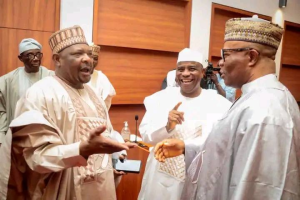
The Nigerian government’s proposed 2024 Tax Reform Bills have ignited a fierce debate, highlighting deep-seated regional tensions. The reforms, which aim to overhaul the nation’s tax framework, face staunch opposition from the Northern Governors’ Forum, who have raised concerns about their potential to marginalize northern states economically and politically.
Overview of the Tax Reform Bills
The proposed reforms, transmitted to the National Assembly by President Bola Tinubu, include four key bills:
1. Nigeria Tax Bill 2024 – Establishes a modern fiscal framework.
2. Tax Administration Bill – Simplifies and consolidates tax laws.
3. Nigeria Revenue Service Establishment Bill – Replaces the Federal Inland Revenue Service (FIRS) with a more autonomous body.
4. Joint Revenue Board Establishment Bill – Introduces mechanisms like a tax tribunal and ombudsman to handle disputes.
These bills aim to increase revenue efficiency and support state autonomy. However, a key feature—the redistribution of Value Added Tax (VAT) revenue based on consumption rather than headquarters location—has fueled controversy.
Northern Governors’ Concerns
Northern leaders argue that the VAT redistribution proposal disproportionately favors economically advanced southern states, where most corporate headquarters are located. Governor Babagana Zulum of Borno warned the bills would hinder the North’s ability to fund salaries and developmental projects. He emphasized that regions reliant on agriculture and smaller-scale economies would suffer, potentially exacerbating poverty and unrest
The Northern Governors’ Forum has directed northern lawmakers to oppose the bills unless they are revised to reflect “equity and fairness.” They maintain that while reform is necessary, it must not deepen regional disparities.
Response from the Presidency
The government has refuted claims of regional bias, stating that the reforms are designed to enhance efficiency and ensure fairness across all states. According to Taiwo Oyedele, Chairman of the Presidential Committee on Fiscal Policy and Tax Reforms, the VAT redistribution model aligns with global best practices and aims to reward regions based on consumption, not corporate presence.
Implications and Broader Context
The tax debate underscores Nigeria’s longstanding economic imbalances, with northern states often trailing their southern counterparts in industrial development and revenue generation. This friction is further compounded by a history of contested fiscal policies, such as the legal battles over VAT collection between federal and state governments.
The outcome of this debate could significantly shape Nigeria’s fiscal landscape and test President Tinubu’s ability to unify the nation while pursuing economic reforms. With northern lawmakers holding a decisive majority in the National Assembly, the bills’ fate hangs in the balance.
As regional tensions mount, the call for inclusive and transparent policymaking grows louder. While the proposed reforms aim to modernize Nigeria’s tax system, their success hinges on addressing legitimate concerns of marginalization and ensuring that no region is left behind. Whether through legislative amendments or broader consultations, finding a middle ground is imperative to avoid exacerbating Nigeria’s already fragile regional relations.

